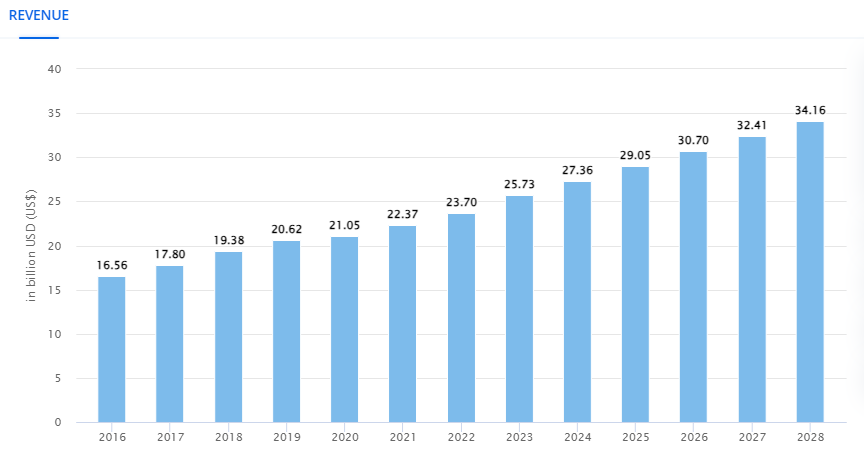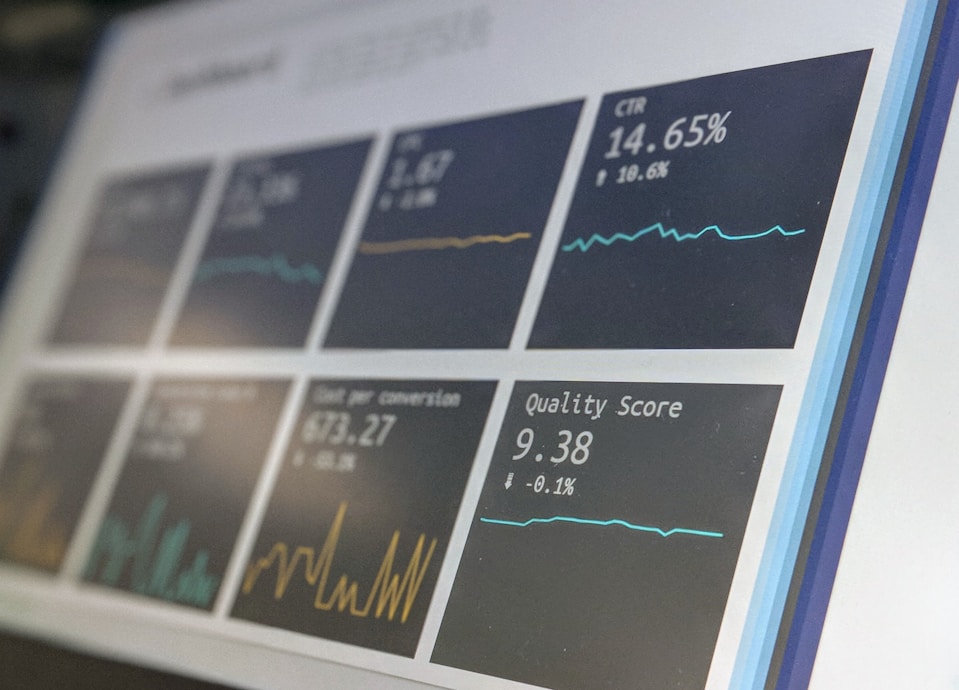In today’s fast-paced digital landscape, data has become the coveted “silver bullet” that grants businesses a competitive edge in the market. Armed with data-driven insights, companies can optimize their operations, improve services, and adapt to market changes.
However, analyzing vast amounts of information is a daunting task and can often be overwhelming. To make this process smooth, business intelligence (BI) steps into the spotlight. BI converts raw data into structured visuals, making it understandable even for non-technical specialists and leading to well-informed decisions.
Market forecasts show that revenue in the BI software segment is projected to reach USD 34.16bn by 2028. So, as the future of BI takes shape, businesses seeking to grow successfully should keep a close eye on this approach.

In today’s article, we will skim through the most common trends of BI to help you discover how you can successfully leverage this technology. But before delving deeper, let’s understand why BI has become so popular.
The Power of BI in Today’s Digital World

In the ever-evolving environment of information technology, business intelligence plays a crucial role, revolutionizing the way we harness the power of data. It has become an essential tool that helps companies succeed and remain innovative while opening doors to a vast array of possibilities.
Basically, BI is the union of the technologies used by organizations to gather, integrate, analyze, and visualize information. Particularly, business intelligence incorporates the use of database management systems, ETL tools, dashboarding platforms, big data, predictive analytics, AI & ML, and more.
From finance and healthcare to retail and manufacturing, BI offers numerous benefits to businesses across diverse industries. It empowers organizations to make informed decisions, enhance customer relationships, mitigate risks, optimize processes, and improve overall efficiency.
So, regardless of your company size and sector, it is worth considering the implementation of this approach. And to ensure you get the maximum of your BI solutions, we suggest exploring what should be taken into account.
BI for Business
Find out the secrets of how business intelligence boosts operations and what BI tools and practices drive data analysis.
Top 7 Trends of Business Intelligence

As technology advances and data continues to play a pivotal role in business success, it is worth staying ahead of the latest BI trends. So, let’s dive in to see what is the future of business intelligence.
1. Self-Service BI
As the name implies, self-service business intelligence is all about empowering business users to access datasets without having deep knowledge and technical skills.
Let’s admit, working with data can be a really overwhelming process which often leads to extra costs and time consumption. But gone are the days when timely business intelligence insights used to be a complicated affair where companies relied on data experts for guidance.
Today, thanks to pre-designed workflows and user-friendly tools of BI, you can filter, sort, and analyze data all on your own. You can simply create visualizations, dashboards, and reports. By transferring analytical work to business users, self-service capability assists in minimizing bottlenecks in business intelligence operations.
2. Large Language Models
One of the latest trends in business intelligence is a combination of large language models (LLMs) with Power BI. It leads to advanced data analysis, such as topic modeling, keyword extraction, and sentiment analysis.
LLMs excel at comprehending and producing human-like content. So, it can bring better natural language processing, paving the way for more accurate communication and interaction between machines and humans. For example, chatbots can grasp the underlying sentiment behind customer queries and provide more relevant answers.
On top of that, LLMs can create narratives around data visualizations, turning raw information into compelling stories. This helps present ideas in a more simple and understandable manner.
3. Data Governance
As the number of information generated continues to grow rapidly, data governance becomes a must-have practice to ensure data quality and security. These two are important in order to provide accurate analysis and further results. Hence, it is one of the trends in business intelligence which shouldn’t be overlooked.
By implementing robust data management practices, companies can establish standardized processes to collect, validate, and maintain information. This, in its turn, brings data accuracy, consistency, and completeness, while instilling confidence in the insights derived from analytical systems.
It is also critical to stay compliant with regulations like the General Data Protection Regulation (GDPR), the California Consumer Privacy Act (CCPA), or the Gramm-Leach-Bliley Act (GLBA), which are designed to safeguard user data privacy and ensure the responsible handling of sensitive information.
Discover key elements of Successful Data Management
Overall, by governing your data effectively, you can not only increase the return on investment from BI efforts but also achieve a healthy balance between data consistency and transparency. As a result, it establishes a solid foundation for making accurate, ethical, and evidence-based decisions.
4. AI Automation
Today businesses seek effective solutions to tackle massive volumes of information that they collect. That’s why automation is one of the core trends that is going to shape the BI industry. With automated BI systems, you can generate reports, dashboards, and visualizations in real time, thus relying on up-to-date information to address challenges.
To drive business intelligence automation, AI technology along with machine learning keeks in. Artificial intelligence can efficiently train complex ML models on massive datasets. For example, deep learning algorithms may train and identify patterns from raw data automatically, removing the need for manual intervention.
Learn more how AI Can Shape the Business
On top of that, ML-driven algorithms can respond to requests and provide needed information in real time. Overall, it empowers companies to quickly explore and extract meaningful insights from large datasets without need for extensive technical expertise.
GenAI for Business
Watch our webinar to uncover how to integrate GenAI for improved productivity and decisions.
5. Embedded BI
Continuing with our list of BI trends, we come to the concept of embedded BI, also known as embedded analytics. As a brief grasp of definition, it’s a process of integrating BI tools into your existing enterprise software. In this case, data is typically placed right within the UI of an application and managed by a BI platform for better usability and decision-making.
For example, you can embed such business intelligence components as dashboards or reports. It will allow you to access relevant insights directly from the applications you are using without the need to switch between the interfaces. So, it’s a perfect way to convey complex information in a more intuitive and understandable manner.
6. Cloud-Based BI
Cloud-based BI leverages data for business intelligence, enabling organizations to access, analyze, and visualize insights efficiently within the cloud environment. This approach has essentially become one of the popular BI trends since Covid-19, when people started to work remotely.
Cloud business intelligence software can be accessed from a variety of devices and web browsers without the cost and challenges related to maintaining physical hardware. Cloud-based BI solutions are usually cost-effective and easy to deploy.
Learn more about how to Optimize Cloud Costs
On top of that, cloud-based BI tools often include collaborative features. They help teams share insights, reports, and dashboards across the whole organization and teammates regardless of their location. As a result, everyone in the company can rely on a single source of truth and stay on the same page.
Though it sounds quite appealing, cloud-based business intelligence can come with potential security issues. Many businesses can have concerns about potential cyber attacks, data breaches, or unauthorized access.
Consequently, companies should prioritize data security when implementing cloud-based BI to harness these issues. They can thoroughly assess the security features provided by cloud vendors, set up strong authentication policies, implement robust access control, and so on to safeguard their sensitive information.
7. Mobile BI
In today’s fast-paced environment, real-time data access is crucial for making timely and relevant decisions anytime and anywhere. So, the last BI trend we couldn’t let slip away unnoticed is mobile business intelligence. This approach empowers interaction with BI data through mobile devices such as smartphones and tablets.
There is no need any longer of being tethered to desktops to access essential information. With that in mind, companies should prioritize the development of mobile-first dashboards that seamlessly deploy on any device to remain relevant and meet users’ on-the-go requirements.
Transform Your Business with BI Tools
As we see, the business intelligence landscape is rapidly shifting. We explored some key trends that are worth paying attention to in order to implement the robust BI tools.
However, to maximize the potential of these tools, you need a skilled team. Don’t worry, if you currently lack the expertise. Velvetech can assist you at every step of the way on your journey to create competitive BI solutions.
Our experts will help you unlock the full value of your data and propel your business forward, leveraging the latest BI trends to ensure you gain the utmost benefit from this approach.
Contact us today.
































